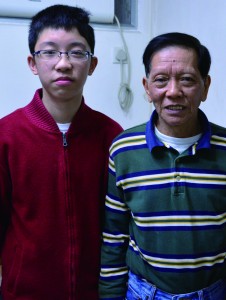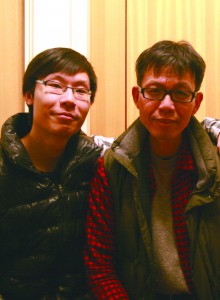Not all men are as open as Cheung, and together with work constraints, the way men are socialised can be an obstacle to their taking up parenting and household responsibilities on their own. They can find it challenging to take up the roles traditionally expected of mothers in a family.
Chan Kam-wah, professor of Applied Social Science at Hong Kong Polytechnic University, has conducted research on single fathers and men’s welfare services. His findings show that society has different perceptions and expectations of gender roles in society which lead to the unequal distribution of housework and childcare in a family, with mothers doing most of the housework while fathers work outside of the home to make money. Therefore, most single fathers are unprepared when they suddenly have to take up a “mother’s role”, due to divorce or the death of their spouse.
Another problem arising from gender stereotypes is that men generally refuse to seek help form others, even when they face great difficulties. As society expect men to be strong and independent, single fathers often choose to push through on their own instead of looking for professional help.
According to the 2011 Population Census Thematic Report, single mothers far outnumbered single fathers throughout the past decade. There are 276 single fathers per 1,000 single mothers (i.e. 27.6 per cent). The total number of single fathers is around 18,000. As there are fewer single fathers, there are fewer services targeting them. This together with gender stereotypes, means the experience of single fatherhood can be a lonely one.
However, Chan does not think there is a disproportionate number of social services targeted at single mothers, as most often mothers are applying for services on behalf of the whole family. Instead of just providing men-specific services, Chan thinks there needs to be a change in the division of responsibilities in families.
For instance, Chan thinks household chores and parenting duties should be shared by both parents and fathers should put more effort into building good relationships with their children. That way, even if they do become single fathers, men will be better able to cope.
Jessie Yu Sau-chu, the chief executive of the Hong Kong Single Parents Association, agrees that traditional gender roles can give men the impression that it is unnecessary for them to improve their parenting or child-raising skills, even after they lose the mothers of their children.
“[For some of them] it’s only after they hit the headlines that they’ll allow people to help them. Sadly, some would rather die with their children than solicit assistance from the service providers,” says Yu.
However, Yu says existing men’s services are inadequate. She says one complaint commonly received from single fathers is they cannot find people in similar situations to talk to. Most single parent support groups in the community are made up of single mothers. In fact, 90 per cent of the cases the association is involved with are single mothers. Yu hopes to organise men’s groups in the association so that they can advise single fathers on how to cultivate father-child relationships and improve problem-solving skills.
Yu says that in general, single mothers may have already have been working mothers who are used to multi-tasking. They may be better equipped to deal with the challenges of single parenthood in that regard. She says these skills can also be learned by men. “Being a single parent is just like a person losing an arm,” says Yu. “What we [the association] can do is limited, but we can help you to see how you can get your remaining arm to function.”
Support from the community and the government is crucial to help single fathers. Yet, as Eric Cheung Tat-ming has pointed out, the most effective support for children comes from within the family itself. While daunting, single fatherhood can also be an eye-opening motivation for fathers to build stronger and closer relationships with their children. As Lo Wing-on, who lost his mother to gastric cancer, says of his father Lo King-lam, “He has done everything he can to keep this family together; he has already given us the best care. What else can we ask for?”
Edited by James Fung








































